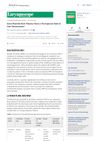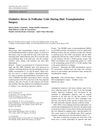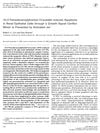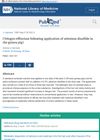 5 citations,
September 2022 in “Antioxidants”
5 citations,
September 2022 in “Antioxidants” A substance from Caulerpa racemosa seaweed may protect against skin damage caused by air pollution by reducing oxidative stress and cell death.
 11 citations,
September 2019 in “Dermatologic Surgery”
11 citations,
September 2019 in “Dermatologic Surgery” A substance called Vascular Endothelial Growth Factor can protect certain hair follicle stem cells from damage caused by androgens, suggesting a new possible treatment for hair loss.
 171 citations,
July 2007 in “Journal of Investigative Dermatology”
171 citations,
July 2007 in “Journal of Investigative Dermatology” A substance called DKK-1 increases in balding areas and causes hair cells to die when exposed to DHT.
 December 2023 in “Redox biology”
December 2023 in “Redox biology” The substance DMC helps get rid of aging cells by triggering a process that causes cell death, which could treat age-related diseases.
 August 2023 in “Stem Cell Research & Therapy”
August 2023 in “Stem Cell Research & Therapy” A substance called Cell-free fat extract can effectively treat common hair loss by increasing hair growth and density.
 8 citations,
April 2011 in “Surgery today”
8 citations,
April 2011 in “Surgery today” A substance called sodium zinc dihydrolipoylhistidinate can significantly reduce hair loss caused by chemotherapy in rats.
 11 citations,
May 2016 in “Naunyn-Schmiedeberg's Archives of Pharmacology”
11 citations,
May 2016 in “Naunyn-Schmiedeberg's Archives of Pharmacology” A substance called 15-deoxy prostaglandin J2 can cause hair follicle cells to die, which might explain how prostaglandin D2 can lead to hair loss.
 December 2019 in “Buletin de psihiatrie integrativă”
December 2019 in “Buletin de psihiatrie integrativă” Skin treatments can improve both skin health and emotional well-being, but they require careful management of patient expectations and potential addiction risks.
 36 citations,
April 2016 in “British journal of dermatology/British journal of dermatology, Supplement”
36 citations,
April 2016 in “British journal of dermatology/British journal of dermatology, Supplement” A substance called VIP might protect hair follicles from being attacked by the immune system, and problems with VIP signaling could lead to hair loss in alopecia areata.
 April 2024 in “Applied biological chemistry”
April 2024 in “Applied biological chemistry” Piperine from black pepper can make hair less oily by blocking fat cell development in hair roots.
 January 2023 in “Laryngoscope”
January 2023 in “Laryngoscope” Platelet-rich plasma (PRP) can help restore hair, but the best method for preparing and using it is still unclear.
 28 citations,
March 2019 in “Journal of Dermatological Science”
28 citations,
March 2019 in “Journal of Dermatological Science” The document concludes that while lab results for hair growth promotion are promising, human trials are needed and better testing methods should be developed.
 162 citations,
August 2004 in “Journal of Investigative Dermatology”
162 citations,
August 2004 in “Journal of Investigative Dermatology” Hair loss causes stress and affects mental health; treatment and support needed.
 13 citations,
March 2020 in “Frontiers in cell and developmental biology”
13 citations,
March 2020 in “Frontiers in cell and developmental biology” A substance called TCQA could potentially darken hair by activating certain genes and increasing melanin.
 April 2018 in “Journal of Investigative Dermatology”
April 2018 in “Journal of Investigative Dermatology” Researchers found a substance in chicken egg yolk that helps hair grow.
 13 citations,
February 2023 in “Aging”
13 citations,
February 2023 in “Aging” A substance from hair follicle stem cells helps heal skin wounds in diabetic mice by promoting cell growth and preventing cell death.
 13 citations,
June 2020 in “Stem Cells International”
13 citations,
June 2020 in “Stem Cells International” A substance from a specific gel helped to grow hair effectively in mice, suggesting it could potentially be used to treat hair loss in humans.
 162 citations,
August 2005 in “The journal of investigative dermatology/Journal of investigative dermatology”
162 citations,
August 2005 in “The journal of investigative dermatology/Journal of investigative dermatology” The new "differential stripping" method effectively measures how much substance gets into hair follicles.
1 citations,
August 2019 in “IntechOpen eBooks” Mesotherapy might be a useful addition to dental surgery to reduce drug use and side effects, but more research is needed.
 10 citations,
August 2015 in “Journal of biophotonics”
10 citations,
August 2015 in “Journal of biophotonics” Hair follicles help substances penetrate the skin faster and more effectively.
 8 citations,
July 2010 in “Aesthetic Plastic Surgery”
8 citations,
July 2010 in “Aesthetic Plastic Surgery” Adding more glutathione to the preservation solution doesn't reduce oxidative stress in hair transplants.
 58 citations,
March 2013 in “Human Reproduction Update”
58 citations,
March 2013 in “Human Reproduction Update” Products should be called 'sperm-safe' only after thorough, well-designed tests.
 9 citations,
November 2012 in “Biomolecules & therapeutics”
9 citations,
November 2012 in “Biomolecules & therapeutics” A compound from brown algae boosts the production of a certain inflammatory substance in skin cells.
 1 citations,
January 1995 in “Journal of Investigative Dermatology”
1 citations,
January 1995 in “Journal of Investigative Dermatology” RU58841, a substance from France, can potentially block the effects of hormones that cause hair loss and excessive hair growth, performing better than a similar substance, cyproterone acetate.
 May 2024 in “Archives of dermatological research”
May 2024 in “Archives of dermatological research” Enz_MoriL from mulberry leaves helps hair growth by affecting specific cell pathways.
 8 citations,
January 2007 in “Hair transplant forum international”
8 citations,
January 2007 in “Hair transplant forum international” Vitamin B12 improves the health and growth of hair micrografts.
 16 citations,
March 2020 in “Facial Plastic Surgery Clinics of North America”
16 citations,
March 2020 in “Facial Plastic Surgery Clinics of North America” Platelet-Rich Plasma (PRP), a substance from a patient's own blood, can stimulate hair regrowth in people with Androgenetic Alopecia (AGA) who haven't had success with other treatments, but more research is needed to optimize its use.
September 2019 in “Journal of Investigative Dermatology” Silibinin may help promote hair growth and treat hair loss.
 4 citations,
January 2001 in “Archives of Biochemistry and Biophysics”
4 citations,
January 2001 in “Archives of Biochemistry and Biophysics” Activated ras can protect kidney cells from a certain substance that causes cell death.
 September 1980 in “PubMed”
September 1980 in “PubMed” Using selenium disulfide on guinea pigs increased hair loss.



























